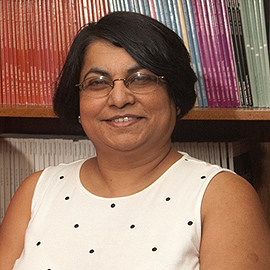
Even as she has been a prolific researcher, speaker, and author of books and peer-reviewed articles, Bandana Purkayastha ’99 Ph.D., professor of sociology and director of graduate studies in the Department of Sociology within the College of Liberal Arts and Sciences, remains focused on her students.
“Teaching is one of the most exciting things within the larger world of the research university,” says Purkayastha, who holds a joint appointment with the Department of Sociology and the Asian American Studies Institute. “At the most basic level, it would not ‘be me’ to just do research at a think tank.”
Her commitment to teaching and her work with students have been recognized by the UConn Alumni Association with its 2010 Award for Faculty Excellence in Teaching at the Graduate Level.
“Part of what we do is to prepare the next generation of scholars,” says Purkayastha. “I’m always excited to see the process through which my advisees identify and carve out their own research niche. They become really excited about obtaining grants to conduct their research, cease being apprentices to their professors, and are ready to soar.”
Purkayastha served as the major doctoral advisor for Anjana Narayan, now assistant professor in the department of psychology and sociology at California State Polytechnic University.
“I find myself constantly amazed by Bandana’s seemingly endless capacity to nurture her students,” Narayan says. “Her guidance has gone way beyond training me as a scholar. She’s helped me build contacts for my writing projects, introduced me to networks of like-minded individuals, and provided valuable guidance for my publications and grants.”
Narayan, who recently won an early career award from the Asia/Asian America section of the American Sociological Association, adds, “From Bandana, I learned the value of mentoring. I see her as the role model for my own interactions with my students and colleagues.”
Purkayastha’s many honors include the 2001 Teaching Promise award from the UConn chapter of the American Association of University Professors and the State of Connecticut General Assembly citation for outstanding achievement, leadership, and commitment to Connecticut. She has twice received the student-run Department of Sociology Graduate Students’ Award for Mentoring, and last year she earned national recognition with the Teaching Award from the Asia/Asian American Section of the American Sociological Association.
In addition to advising at least a dozen sociology undergraduates each year, including University Scholars and Honors students, she is the major advisor for four Ph.D. candidates and associate advisor for three. She has been the major advisor for nine students who have earned master’s degrees and associate advisor for 10 students who have either earned a master’s or are in the process of doing so.
“I have really wide-ranging interests, so I keep up with multiple fields. That makes it easier to guide graduate students in their research and publications,” says Purkayastha, who annually reviews 1,400 manuscripts as deputy editor of the journal Gender & Society.
Her teaching and research interests include human rights within the United States, and the intersection of race, class, gender, and ethnicity in transnational communities. “For me, there are no sharp boundaries between teaching, mentoring, and research,” Purkayastha says. “Classroom teaching is just a small component of how I look at teaching. Successful mentoring is a function of who you’re mentoring: it is developed as you’re thinking of particular students and what you can do to make sure they keep growing.”


